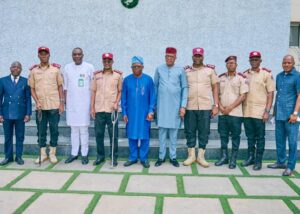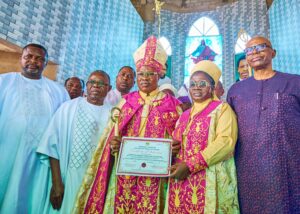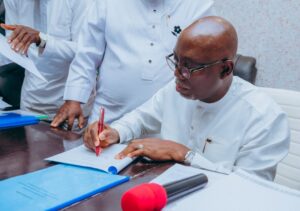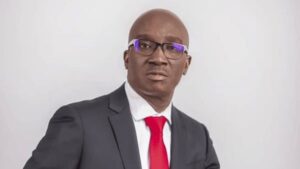How Nigeria will exit recession, by FG
ALTHOUGH Mrs Zainab Ahmed, Minister of Fin- ance, Budget and National Planning, is optimistic that Nigeria will soon exit the current recession, experts have said unless the government is resolute about taking the appropriate steps, the recession may linger longer than anticipated.
The minister hinged her optimism on the government’s fiscal, real sector and monetary interventions.
This is even as the House of Representatives said that the 2021 budget lacked the capacity to take the country out of the current recession.
Nigeria officially slid into its second recession in four years last week with the National Bureau of Statistics (NBS) announcing that the economy experienced 3.62 per cent contraction in the third quarter of this year. Although this was an improvement on the 6.1 per cent contraction recorded in the second quarter, the two consecutive contractions pushed the economy into recession.
While speaking at the 26th Nigerian Economic Summit on Monday, Mrs Ahmed said Nigeria would exit the cur- rent recession either in the fourth quarter of this year or by the first quarter of 2021.
The Finance Minister, who blamed the recession on COVID-19 pandemic and the subsequent lockdown, said, “Let me remind us that be- fore the impact of COVID-19, the Nigerian economy was experiencing sustained growth, which had been improving quarter by quarter until the second quarter of 2020, when the impact of the COVID-19 was felt.”
She added, “Nigeria is not alone in this, but I will say that Nigeria has outperformed other economies in terms of the record of a negative growth.”
Comparing Nigeria’s performance with that of South Africa, the minister said South African economy recorded a decline of 50 per cent in the second quarter and would record a deeper negative growth in the third quarter.
She said, “While the eco- nomy entered into reces- sion in the third quarter, the trend of the growth suggests that this will be a short-lived recession, and indeed by the fourth or, at worst, the first quarter of 2021, the country will exit recession.
“Our expectation of a quick exit, which will be histor- ically fast, is anchored on the several complementary fiscal, real sector and monet- ary interventions that have been proactively introduced by government to forestall a far worse decline of the economy and alleviate the neg- ative consequences of the pandemic.”
While concurring with the Finance Minister on the likelihood of the country having a quick exit from the recession, Director Gen- eral of the Lagos Chamber of Commerce and Industry (LCCI), Dr Muda Yusuf, said that would be anchored on the government restoring normalcy to the foreign ex- change market by broad- ening the scope of market expression in the allocation mechanism.
Yusuf, in his response to en- quiries on the recession by the Nigerian Tribune, said, “The news of the recession did not come as a surprise. The economic contraction was 3.62 per cent in the third quarter as against 6.1 per cent in second quarter. With these numbers, we can possibly say that the worst is over as the contraction in the third quarter was much less than what we experienced in the second quarter.
“Regrettably, the #EndSARS crisis may cause the recession to linger to the fourth quarter. The protests and the destruction that fol- lowed were a major setback for our economic recovery prospects.
“From an economic perspective, 2020 has been a very bad year, the worst in recent history. We are faced with the double jeopardy of a stumbling economy and spiraling inflation. The October inflation numbers of 14.23 per cent was the highest in 10 months. In economic parlance, this condition is characterised as stagflation. The effects of these developments are evident in business and in households.
“Sales are slowing, profit margins are being eroded, production costs are escalating, unemployment is rising, poverty situation is worsening, purchasing power is weakening and there is a general social discontent.
“Regrettably, and as if these were not bad enough, President Muhammadu Buhari the business community continues to grapple with policy, institutional and regulatory challenges impeding investment.”
Restore normalcy to foreign exchange market
He added, “To facilitate quick recovery, we need to restore normalcy to the foreign exchange market by broadening the scope of market expression in the allocation mechanism. The ports processes, especially the key institutions in the in- ternational trade processes, need to be more investment friendly. Trade is critical to recovery.
We should show greater commitment to the fixing of the structural issues to reduce production and operating costs for investors in the economy.
“Following the #EndSARS experience, the state of in- ternal security is beginning to impact negatively on investors’ confidence. Security presence is becoming less visible especially in the major cities. The psychological effects could adversely affect investment and eco- nomic recovery.”
But Professor Festus Epetimehin did not see any quick way out of the reces- sion because, according to him, “unless we change our ways of managing the eco- nomy, we will not exit the recession anytime soon.”
Although he acknowledged the contribution of COVID-19 pandemic and the #EndSARS protests to the contraction of the economy, Epetimehin, who is the Dean of the College of Management Sciences at Joseph Ayo Babalola, Ikeji Arakeji, Osun State, said mismanagement of the economy preceded the pandemic, adding that it only exposed the inefficiency in and mismanagement of the economy.
He said, “Allied to the mismanagement is the ever rising corruption. Where corruption is as preponder- ant as it is in our country, economic growth cannot happen. Even if there is growth it would be growth on paper, growth that will not benefit the people. So, unless those at the helms of affairs in this country are determined to change their way, curb corruption and stop the hemorrhage in the system, the recession will linger for long.”
Create enabling environment for business
Epetimehin also said that for the country to exit the re- cession, the government will have to create an enabling environment to make businesses thrive and encourage production.
“Recession is a consequence of a slide in pro- ductive activities. To get out of the rut, we need to increase productivity. It is this that would boost the GDP and take the country out of recession. If the government creates an enabling environment for businesses to maximize their capacities, it would result in creation of job opportunities, improvement in the people’s wellbeing and invariably, improvement in the economy.”
Expansionary fiscal monet ary policies needed NECA
In its response, the Nigeria Employers’ Consultative Association (NECA) called on the government to develop strategies to stimulate the economy.
NECA, the umbrella organization of employers in the Organised Private Sector of Nigeria, said this on Monday while responding to a ques- tion by the Nigerian Tribune.
Speaking through its Director General, Dr Timothy Olawale, said, “We believe that the economic recession the country is currently ex- periencing is more of inflationary impact, therefore, the policy makers need to develop strategies in addressing the cost push inflation and stimulate the economy.
“In our earlier opinion after the release of the Q1 GDP growth rate, we highlighted that the quantum of the in- tervention in stimulating the economy out of anticipated recession was too little and predicted that the economy would plunge into recession, if not addressed. We advoc- ated for further increase in the stimulus packages ad- dressing sectors with huge potentials for job creation, construction, manufacturing, transportation and trade.”
NECA therefore called on policy makers, both fiscal and monetary authorities, “to develop strategies to in- crease aggregate demand in the economy by designing further stimulus pack- ages directly to stimulate consumption and a further increase in government spending in order to spark economic activities. Where possible, advocating for tax cut to promote business capital investment, encouraging local and foreign investment in order to move the economy out of recession.
“We call for more robust and comprehensive expan- sionary fiscal and monetary policy packages to expedi- tiously reflate the economy out of the current crisis.”
Tweak monetary policy
For Mr. Biyi Adesuyi, the Chief Executive Officer of Wealthgate Advisor, the second recession, in the life of the present administration was not unexpected since, according to him, the fiscal policy of the incumbent government is wide off the mark.
“All these talks about survival funding, trader moni, and others are nothing, but cosmetic dressing. Govern- ment is just beating about the bush. Besides, it was obvious that the borrowing spree embarked upon by this government, is not getting the right outcome, as evidenced from what they are financing with the borrowing,” he stated.
“Also the monetary policy is committed into the hands of people who are less knowledgeable in monetary economies. For instance, the CBN governor appears as if he doesn’t know how to manage this. It’s abnor- mal for our economy to be having inflations at 13 per cent, the official figure, since the real figure will be quite higher, and the interest rate is much lower than the inflation rate.
“In any ideal setting, interest rate is always above inflation rate. But the man has kept in- terest rate on deposit down, to the extent that interest rate on loans by banks is running into two digits, while the in- terest rate on deposit is just 1.5 per cent.
“That’s a disincentive to saving, and when people are not saving, how do you get enough funds to finance and provide credit to critical sectors of the economy? People will not be ready to bring their money into the financial system, because of the discouraging interest rate the CBN has forced on us, and there is no way that will help the government’s financial inclusion drive,” he added.
Develop market for angel investors
Adesuyi believes the way out of the present economic mess is for the federal government to improve the busi- ness climate and encourage entrepreneurs to come in.
“Remove all the disincentives that discourage busi- nesses, then provide finances in the form of equity. Google did not start with loan. Facebook did not start with loan, Microsoft did not start with loan, and Apple did not start with loan. All these giants in America did not start with loans. They started with private equity. So government should develop the market for private equity.
“Nigerian government should develop the market for angel investors. The government should prepare a robust ecosystem for entrepreneurs and investors to interact, with a view to providing critical funding, to new growth sectors of the economy. Once we have this, and all these unemployed graduates are now channel- ingtheirenergiestoproduc- tion as emerging entrepreneurs, in critical sectors of the economy, the economy will bounce back,” he added.
Reduce poverty, cost of governance
Mr Taiwo Oyedele. West Africa Tax Leader, PriceWa- terHouseCooper (PwC) said, “We have to look beyond GDP and focus on policies to create jobs, support businesses and lift households out of poverty across all levels of government.”
Managing Director, Cowry Assets Management Limited, Mr. Johnson Chukwu, said while the probability of an early exit was high,the recovery might be slowed down by the aftermath of the #EndSARS protest and rising inflation rate.
2021 budget not capable of addressing Nigeria’s recession —Reps
The House of Representat- ives Committee on Science and Technology, on Monday, said the 2021 budget was incapable of lifting Nigeria out of the current economic recession.
A member of the committee, Hon. Awaji Inombek Abiante from Rivers State, who spoke during a budget defence by the Ministry of Science and Technology, pointed out that the docu- ments had allocation flaws that should be corrected be- fore the final passage.
This followed the absence of the Minister of Finance, Zainab Ahmed and the Director-General, DG, Budget Office, Ben Akabueze.
The Committee had conten- ded that trivial activities got 100 per cent funding while capital projects that were people-orientated suffered neglect.
Both the Minister and the DG budget who were ex- pected to appear before the Committee to shed some lights on the budget however sent representatives which the lawmakers considered as an affront.
Speaking at the session, Hon Abiante said: “It won’t be very appropriate for their own views not to be reflected. For having this opportunity, I want it on re- cord that it probably could have been an intended absence to avoid scrutiny of what had been presented. If there had been a written document before us, allowing the DG, probably, would have taken a few questions because to my mind, having looked at the budget of some agencies that we supervise as the Committee on Science and Technology as well as some other agencies supervised by some other committees, I want to honestly say that the budget office is one of the greatest problems we have in this country.
“What we have before us is no budget. We have looked at it. And if we continue like this, then we know where the problem of this country lies. Somebody may have been misinforming or even ill-advising Mr. President.”
Nigerian Tribune













Post Comment